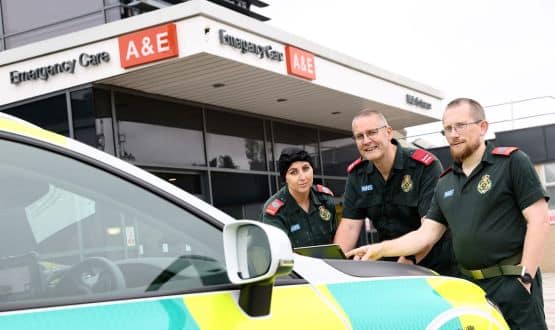GDE hyperbole risks hobbling NHS IT plans
- 1 November 2018

It’s two years since England’s first digital exemplars were announced, amid promises of global excellence and extensive knowledge sharing. But as Digital Health editor and founder Jon Hoeksma considers the GDE programme’s progress and its historical roots, he argues its overblown language conceals a relatively small investment – and a knowledge-sharing challenge that is yet to be fully addressed.
When politicians tell you some part of the UK economy is ‘world class’ it’s often a sign that it might be in trouble. When they tell you it’s the ‘envy of the world’ it’s usually time to really start worrying.
It’s unfortunate then that the global digital exemplar (GDE) programme was loaded up by politicians and senior civil servants with such an overblown moniker.
Because, so far at least, it is by historic standards a rather modest NHS IT investment programme involving a relatively small number of trusts.
One large pinch of salt, please
The eHospital programme at Cambridge University Hospitals NHS Foundation Trust was budgeted at £200m for a single trust, yet the total GDE programme is only spending twice this amount. By international comparison, GDE funding is very modest. The US Department of Defense’s EHR programme – a large scale EHR initiative that also prominently features Cerner – is costed at $4.3 billion.
So while the GDE programme is providing some welcome investment, particularly in areas like ambulance services, the high-blown claims about creating ‘global’ exemplars should be taken, so far at least, with a very large pinch of salt.
Not that there is anything wrong with regional or national exemplars; certainly saves on air fares. Strip away the exemplar hyperbole and there is a compellingly simple idea: that the NHS could really benefit from having some reference sites on digitisation which are committed to capturing their experience and sharing their knowledge.
This plays particularly well to the NHS’s collectivist, collaborative culture – which thankfully just about survived attempts to transplant a market ethos.
An idea with a long history
Like most good ideas, it’s one that has been around a lot longer than you might think. Hospital references sites were actually part of the first national information technology for the English NHS, published in 1992.
These didn’t work out as intended, largely because the ambition was ahead of the available technology. Though the initiative did provide a springboard for some: Wirral, for instance, pioneered e-prescribing 25-years ago. And after a lengthy hiatus, it is once again an exemplar.
Then 1999’s Information for Health called for the establishment of reference sites, called beacons, which became the Electronic Record Development Interoperability Programme (ERDIP).
The ERDIP evaluations are well worth digging out of the archive and reading for current would-be local health and care record exemplars (LHCREs), as one of the key findings was that interoperability was blocked by intransigent, uncooperative suppliers telling NHS customers what they were allowed. Sound familiar?
Remembering the dark times
Pilots and reference sites came to be seen as strictly for wimps during the dark era of the National Programme for IT (NPfIT). This was a time when having relevant past experience of health IT, or indeed proven knowledge of health, was initially seen as akin to a thought crime. Indeed, this was the period of heroically big billion-pound contracts.
An expensive circus cavalcade of lawyers, consultants, suppliers and civil servants promised NPfIT contracts would be ‘world class’ and the taxpayer would only foot the bill for delivery.
Unfortunately the lawyers and management consultants actually left the NHS with a ‘world class’ mess, providing a case study in how not to manage a project. A decade on from ‘accidentally’ sacking Fujitsu, the Department of Health is finally close to settling a legal dispute with the firm for a reported £400m. In connected litigation, Cerner is understood to be seeking millions for lost earnings resulting from the termination of Fujitsu’s contract.
So it is fortunate the idea of sharing experience and developing exemplars is back in favour. Its renaissance is most notably attributable to Bob Wachter’s 2016 review of NHS IT.
He concluded that trusts were at different stages of readiness to digitise. And so a decision was taken by then-health secretary Jeremy Hunt to channel limited amounts of funding available into a small number of reference sites: the global digital exemplars, from which less digitally advanced trusts could learn.
We now have 16 acute global digital exemplars, which have 17 fast followers. There are seven mental health GDEs, and three ambulance GDEs. Further waves – and new community GDEs – are on the cards.
The blueprinting challenge
Added on top of the programme were the beginnings of a blueprinting process to variously share lessons and how-to methodology. The process is one of the most promising parts of the GDE initiative, and there is no question that many GDE NHS IT leaders are genuinely committed to sharing lessons.
With EPRs increasingly converging on the same basic set of capabilities, implementation know-how is where much value lies. One of the challenges is to separate blueprints from systems and suppliers. Can useful generic blueprints be created or are they all tied to suppliers?
Speaking at September’s UK Health Show, Paul Charnley – CIO at Wirral University Teaching Hospital NHS Foundation Trust and one of the national leads on blueprints – admitted this is a real challenge, with suppliers protective of their IP.
Charnley also suggested vendor-neutral blueprints would be a challenge –perhaps achievable in some areas and less likely in others.
If the GDE programme hopes to become an exemplar then it needs to double down on systemising and sharing this knowledge and experience. If blueprints are to be credible and useful they must be openly published so they can be widely discussed, debated, contributed to, sometimes challenged or disputed, but most of all learned from.
Just like medicine or any other academic discipline, ultimately you have to publish to be credible.




